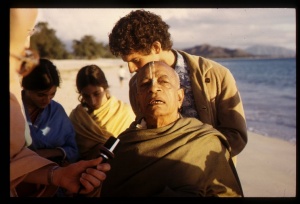SB 9.6.35-36: Difference between revisions
m (1 revision(s)) |
(Vanibot #0054 edit - transform synonyms into clickable links, which search similar occurrences) |
||
| (One intermediate revision by one other user not shown) | |||
| Line 1: | Line 1: | ||
{{info | {{info | ||
|speaker= | |speaker=Śukadeva Gosvāmī | ||
|listener=King | |listener=King Parīkṣit | ||
}} | }} | ||
[[Category:Srimad-Bhagavatam - Canto 09 Chapter 06]] | |||
[[Category:Bhagavatam Verses Spoken by Sukadeva Gosvami - Vanisource|090635]] | |||
<div style="float:left">'''[[Srimad-Bhagavatam]] - [[SB 9|Ninth Canto]] - [[SB 9.6: The Downfall of Saubhari Muni|Chapter 6: The Downfall of Saubhari Muni]]'''</div> | |||
<div style="float:right">[[File:Go-previous.png|link=SB 9.6.33-34]] '''[[SB 9.6.33-34]] - [[SB 9.6.37]]''' [[File:Go-next.png|link=SB 9.6.37]]</div> | |||
{{RandomImage}} | |||
==== TEXTS 35-36 ==== | ==== TEXTS 35-36 ==== | ||
<div | <div class="verse"> | ||
īje ca yajñaṁ kratubhir | :īje ca yajñaṁ kratubhir | ||
ātma-vid bhūri-dakṣiṇaiḥ | :ātma-vid bhūri-dakṣiṇaiḥ | ||
sarva-devamayaṁ devaṁ | :sarva-devamayaṁ devaṁ | ||
sarvātmakam atīndriyam | :sarvātmakam atīndriyam | ||
dravyaṁ mantro vidhir yajño | |||
yajamānas tathartvijaḥ | :dravyaṁ mantro vidhir yajño | ||
dharmo deśaś ca kālaś ca | :yajamānas tathartvijaḥ | ||
sarvam etad yad ātmakam | :dharmo deśaś ca kālaś ca | ||
:sarvam etad yad ātmakam | |||
</div> | </div> | ||
| Line 21: | Line 27: | ||
==== SYNONYMS ==== | ==== SYNONYMS ==== | ||
<div | <div class="synonyms"> | ||
''[//vanipedia.org/wiki/Special:VaniSearch?s=īje&tab=syno_o&ds=1 īje]'' — he worshiped; ''[//vanipedia.org/wiki/Special:VaniSearch?s=ca&tab=syno_o&ds=1 ca]'' — also; ''[//vanipedia.org/wiki/Special:VaniSearch?s=yajñam&tab=syno_o&ds=1 yajñam]'' — the Lord of sacrifices; ''[//vanipedia.org/wiki/Special:VaniSearch?s=kratubhiḥ&tab=syno_o&ds=1 kratubhiḥ]'' — by great ritualistic performances; ''[//vanipedia.org/wiki/Special:VaniSearch?s=ātma&tab=syno_o&ds=1 ātma]-[//vanipedia.org/wiki/Special:VaniSearch?s=vit&tab=syno_o&ds=1 vit]'' — fully conscious by self-realization; ''[//vanipedia.org/wiki/Special:VaniSearch?s=bhūri&tab=syno_o&ds=1 bhūri]-[//vanipedia.org/wiki/Special:VaniSearch?s=dakṣiṇaiḥ&tab=syno_o&ds=1 dakṣiṇaiḥ]'' — by giving large contributions to the ''brāhmaṇas''; ''[//vanipedia.org/wiki/Special:VaniSearch?s=sarva&tab=syno_o&ds=1 sarva]-[//vanipedia.org/wiki/Special:VaniSearch?s=deva&tab=syno_o&ds=1 deva]-[//vanipedia.org/wiki/Special:VaniSearch?s=mayam&tab=syno_o&ds=1 mayam]'' — consisting of all the demigods; ''[//vanipedia.org/wiki/Special:VaniSearch?s=devam&tab=syno_o&ds=1 devam]'' — the Lord; ''[//vanipedia.org/wiki/Special:VaniSearch?s=sarva&tab=syno_o&ds=1 sarva]-[//vanipedia.org/wiki/Special:VaniSearch?s=ātmakam&tab=syno_o&ds=1 ātmakam]'' — the Supersoul of everyone; ''[//vanipedia.org/wiki/Special:VaniSearch?s=ati&tab=syno_o&ds=1 ati]-[//vanipedia.org/wiki/Special:VaniSearch?s=indriyam&tab=syno_o&ds=1 indriyam]'' — transcendentally situated; ''[//vanipedia.org/wiki/Special:VaniSearch?s=dravyam&tab=syno_o&ds=1 dravyam]'' — ingredients; ''[//vanipedia.org/wiki/Special:VaniSearch?s=mantraḥ&tab=syno_o&ds=1 mantraḥ]'' — chanting of the Vedic hymns; ''[//vanipedia.org/wiki/Special:VaniSearch?s=vidhiḥ&tab=syno_o&ds=1 vidhiḥ]'' — regulative principles; ''[//vanipedia.org/wiki/Special:VaniSearch?s=yajñaḥ&tab=syno_o&ds=1 yajñaḥ]'' — worshiping; ''[//vanipedia.org/wiki/Special:VaniSearch?s=yajamānaḥ&tab=syno_o&ds=1 yajamānaḥ]'' — the performer; ''[//vanipedia.org/wiki/Special:VaniSearch?s=tathā&tab=syno_o&ds=1 tathā]'' — with; ''[//vanipedia.org/wiki/Special:VaniSearch?s=ṛtvijaḥ&tab=syno_o&ds=1 ṛtvijaḥ]'' — the priests; ''[//vanipedia.org/wiki/Special:VaniSearch?s=dharmaḥ&tab=syno_o&ds=1 dharmaḥ]'' — religious principles; ''[//vanipedia.org/wiki/Special:VaniSearch?s=deśaḥ&tab=syno_o&ds=1 deśaḥ]'' — the country; ''[//vanipedia.org/wiki/Special:VaniSearch?s=ca&tab=syno_o&ds=1 ca]'' — and; ''[//vanipedia.org/wiki/Special:VaniSearch?s=kālaḥ&tab=syno_o&ds=1 kālaḥ]'' — the time; ''[//vanipedia.org/wiki/Special:VaniSearch?s=ca&tab=syno_o&ds=1 ca]'' — also; ''[//vanipedia.org/wiki/Special:VaniSearch?s=sarvam&tab=syno_o&ds=1 sarvam]'' — everything; ''[//vanipedia.org/wiki/Special:VaniSearch?s=etat&tab=syno_o&ds=1 etat]'' — all these; ''[//vanipedia.org/wiki/Special:VaniSearch?s=yat&tab=syno_o&ds=1 yat]'' — that which is; ''[//vanipedia.org/wiki/Special:VaniSearch?s=ātmakam&tab=syno_o&ds=1 ātmakam]'' — favorable for self-realization. | |||
</div> | </div> | ||
| Line 28: | Line 34: | ||
==== TRANSLATION ==== | ==== TRANSLATION ==== | ||
<div | <div class="translation"> | ||
The Supreme Personality of Godhead is not different from the auspicious aspects of great sacrifices, such as the ingredients of the sacrifice, the chanting of Vedic hymns, the regulative principles, the performer, the priests, the result of the sacrifice, the arena of sacrifice, and the time of sacrifice. Knowing the principles of self-realization, Māndhātā worshiped that transcendentally situated Supreme Soul, the Supreme Personality of Godhead, Lord Viṣṇu, who comprises all the demigods. He also gave immense charity to the brāhmaṇas, and thus he performed yajña to worship the Lord. | The Supreme Personality of Godhead is not different from the auspicious aspects of great sacrifices, such as the ingredients of the sacrifice, the chanting of Vedic hymns, the regulative principles, the performer, the priests, the result of the sacrifice, the arena of sacrifice, and the time of sacrifice. Knowing the principles of self-realization, Māndhātā worshiped that transcendentally situated Supreme Soul, the Supreme Personality of Godhead, Lord Viṣṇu, who comprises all the demigods. He also gave immense charity to the brāhmaṇas, and thus he performed yajña to worship the Lord. | ||
</div> | </div> | ||
__NOTOC__ | |||
<div style="float:right; clear:both;">[[File:Go-previous.png|link=SB 9.6.33-34]] '''[[SB 9.6.33-34]] - [[SB 9.6.37]]''' [[File:Go-next.png|link=SB 9.6.37]]</div> | |||
__NOTOC__ | |||
__NOEDITSECTION__ | |||
Latest revision as of 16:13, 19 February 2024

A.C. Bhaktivedanta Swami Prabhupada
TEXTS 35-36
- īje ca yajñaṁ kratubhir
- ātma-vid bhūri-dakṣiṇaiḥ
- sarva-devamayaṁ devaṁ
- sarvātmakam atīndriyam
- dravyaṁ mantro vidhir yajño
- yajamānas tathartvijaḥ
- dharmo deśaś ca kālaś ca
- sarvam etad yad ātmakam
SYNONYMS
īje — he worshiped; ca — also; yajñam — the Lord of sacrifices; kratubhiḥ — by great ritualistic performances; ātma-vit — fully conscious by self-realization; bhūri-dakṣiṇaiḥ — by giving large contributions to the brāhmaṇas; sarva-deva-mayam — consisting of all the demigods; devam — the Lord; sarva-ātmakam — the Supersoul of everyone; ati-indriyam — transcendentally situated; dravyam — ingredients; mantraḥ — chanting of the Vedic hymns; vidhiḥ — regulative principles; yajñaḥ — worshiping; yajamānaḥ — the performer; tathā — with; ṛtvijaḥ — the priests; dharmaḥ — religious principles; deśaḥ — the country; ca — and; kālaḥ — the time; ca — also; sarvam — everything; etat — all these; yat — that which is; ātmakam — favorable for self-realization.
TRANSLATION
The Supreme Personality of Godhead is not different from the auspicious aspects of great sacrifices, such as the ingredients of the sacrifice, the chanting of Vedic hymns, the regulative principles, the performer, the priests, the result of the sacrifice, the arena of sacrifice, and the time of sacrifice. Knowing the principles of self-realization, Māndhātā worshiped that transcendentally situated Supreme Soul, the Supreme Personality of Godhead, Lord Viṣṇu, who comprises all the demigods. He also gave immense charity to the brāhmaṇas, and thus he performed yajña to worship the Lord.